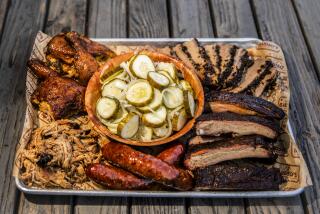Safe Use of Biosolids
- Share via
Re your Dec. 17 editorial, “What’s in ‘Organic Food’? Still Plenty of Controversy”:
Your editorial implied the public would be safe if sewage sludge use were prohibited from the definition of “organic.” You did not mention the inclusion of raw, unprocessed animal manures in the organic production of fruits and vegetables. Animal manures are high in soluble nutrients that could contaminate the ground water if not properly applied and managed. Outbreaks of cryptosporidium in Milwaukee and pfiesteria on the East Coast were related to animal manures. Despite these risks and the fact that the rule precludes any practice that could contaminate water by nitrates and bacteria, raw animal manures are permitted.
On the other hand, biosolids (treated sewage sludge) is a highly regulated material. Biosolids applied to agricultural land for the production of crops for human consumption “presents negligible risk to the consumer” according to the National Academy of Sciences’ National Research Council. You claim “its use in any kind of agriculture is questionable, given the toxic industrial waste it often contains, including cadmium and lead.” Between 1980 and 1991 Los Angeles reduced the level of cadmium and lead discharged to its sewage system by 93% and 87%, respectively. Farmers who have used the city’s biosolids report increased yields and reduced irrigation and herbicide needs.
ELLEN STEIN, President
L.A. Board of Public Works
More to Read
Eat your way across L.A.
Get our weekly Tasting Notes newsletter for reviews, news and more.
You may occasionally receive promotional content from the Los Angeles Times.







